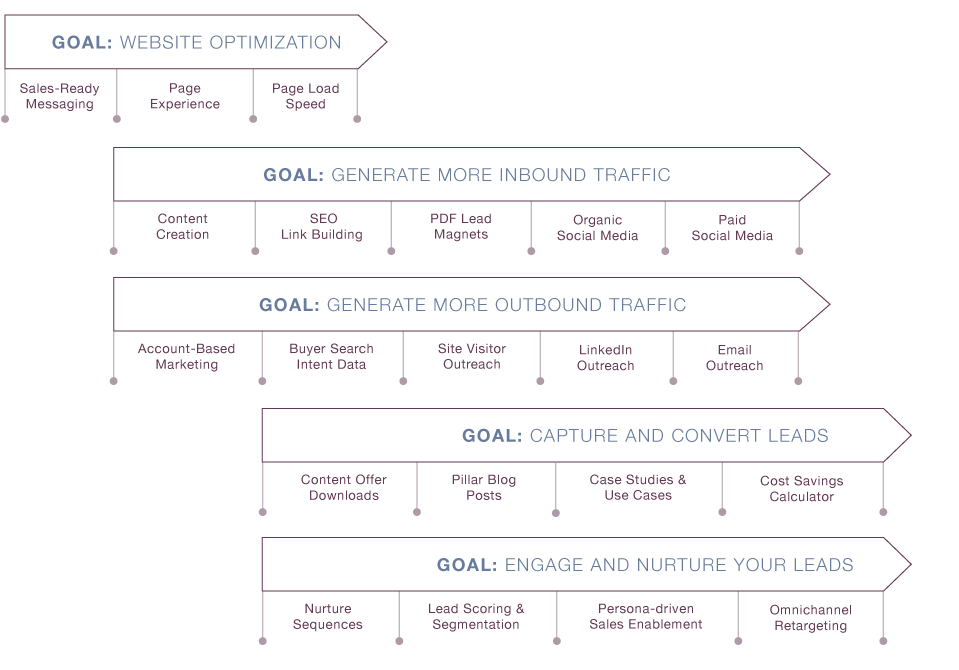Effective legal marketing strategy for law firms is key to client growth and firm success in 2025.
This article presents 20 proven strategies to enhance your marketing efforts and grow your law firm stand out in the legal industry. Discover the essentials of legal marketing now.
Key Takeaways
-
Law firm marketing requires a comprehensive approach, focusing on brand building, targeted strategies, and a clear budget to attract and retain clients.
-
An effective law firm marketing strategy enhanced by Law firm marketing agency helping with SEO, content marketing, and social media engagement, is crucial for law firms to stand out and convert visitors into clients.
-
Regular measurement and adjustment of marketing efforts through KPIs and analytics tools are essential for optimizing strategies and ensuring effective client acquisition.
Understanding Law Firm Marketing

An effective Law firm marketing strategy involves much more than just advertising services; it’s about building a law firm's brand that's practicing law to resonate with potential law firm clients and establishing a reputation for law firm SEO. that stands out in a crowded market. Effective marketing is crucial for the growth and success of any law firm.
Most law firms benefit from a tailored legal marketing plan that outlines specific law firm legal marketing strategies and, content channels, legal marketing budgets, and a particular target audience. Focusing on these elements enables law firms to attract new clients while maintaining and growing their practice.
Difference Between Marketing Strategy and Law Firm Marketing Plan
Understanding the difference between a marketing strategy and a marketing plan is fundamental for any law firm’s marketing efforts. A marketing strategy outlines the overarching goals and direction, while a marketing plan details the specific actions needed to achieve those goals.
For instance, a full law firm marketing plan and strategy might focus on increasing brand and awareness, whereas the marketing plan will include the steps to achieve this, such as content creation, SEO, and ad campaigns.
Importance of a Marketing Budget
A well-defined law firm marketing program budget is essential for law firms, as it helps set expectations, track ROI, and measure the success of various marketing initiatives. Typically, a law firm is advised to allocate 7%-8% of their gross revenue towards their law firm marketing budget. However, certain practice areas like personal injury and family law might require law firm spend on a higher budget to stay competitive.
Establishing a budget for your marketing programs allows firms to strategically spend on marketing activities, that align with their marketing goals.
Building an Effective Online Presence
In 2025, a compelling online presence is crucial for law firms to attract new clients and stand out in a competitive legal practice like family law. Integrating SEO, content marketing, and paid advertising can significantly enhance a law firm’s visibility and engagement.
These strategies help build brand awareness and drive traffic to key components of the law firm’s website, ultimately converting website visitors to into clients.
Creating a Professional Law Firm Website
A professional law firm website is often the first impression a potential client's first impression or clients have of your practice area. A well-designed website allows law firms to showcase their services and establish a professional image, which can impress potential clients and encourage them to make contact.
Essential features include a professional design, key messaging, and law firm SEO optimization to attract organic traffic. Additionally, including attorney biographies with detailed information about experience, education, and practice areas can instill trust and confidence in potential clients.
Moreover, incorporating promotional and educational video content can enhance engagement and provide valuable information to site visitors. Platforms like WordPress enable law firms to build and maintain a professional website at a minimal cost, making it accessible even for small firms.
Search Engine Optimization (SEO) for Law Firms
Search Engine Optimization (SEO) is a critical component of any law firm marketing plan as it enhances visibility in search results and drives traffic to the website. High-quality content and backlinks are vital for establishing authority and improving SEO.
Law firms must ensure their websites are optimized for search engines by featuring relevant content, good site speed, and mobile responsiveness. Without a highly ranked website, law firms risk missing out on substantial client leads.
Investing in SEO can have significant long-term benefits. Typically, it takes about six months to start seeing leads from SEO link building, but the impact can be profound. A recommended monthly budget for organic SEO campaigns is between $3k to $5k, which can drive a substantial increase in website traffic and leads.
Leveraging Social Media Platforms
Social media marketing is an increasingly important aspect of small law firm' marketing efforts. About 42% of small law firms acquire new clients through social media marketing. Creating strategic social media profiles can lead potential clients to your website for more information. Social media marketing platforms also allow firms to engage directly with their communities, fostering connections that can lead to client referrals.
Effective use of social media includes posting regularly, engaging with followers, and leveraging platforms for client testimonials. Social media posts on platforms like Facebook, LinkedIn, and Twitter can be particularly effective for law firms. An active social media presence increases visibility and builds trust with potential clients.
Content Marketing Strategies

Content creation and distribution by a Law firm marketing agency is a powerful tool for law firms, encompassing various tactics that showcase expertise and attract prospective clients. Key content types include practice area pages, blogs, and resource centers, all tailored to address client needs.
Aligning content with an Ideal Customer Profile (ICP) can improve conversion rates and generate quality leads.
Blogging for Law Firms
Blogging is an effective way for law firms to address complex legal topics and provide valuable insights, demonstrating their expertise. Regularly updated blog content enhances a law firm’s SEO by signaling to search engines that the website is active and relevant. Author profiles for blog posts establish E-E-A-T (Experience, Expertise, Authoritativeness, Trustworthiness) and enhance the and grow your law firm name’s credibility.
Outsourcing blog writing can lead to greater consistency and quality, ensuring that posts are professionally crafted and adhere to a strategic schedule. This approach allows law firms to maintain a robust content strategy without overburdening their in-house team.
Video Marketing
Video marketing has become an essential strategy for law firms looking to connect with a potential client. Video content can create a more dynamic and engaging experience compared to traditional formats. It allows firms to explain complex legal services in an easily digestible format, making it more accessible to a broader target audience.
Incorporating best practices and high production quality can significantly enhance the effectiveness of video content.
Email Marketing Campaigns
Email marketing is a crucial tool for nurturing leads, keeping clients informed, and maintaining lasting relationships. Effective email campaigns can educate recipients about legal issues, share firm news, and offer valuable resources, helping to build and maintain a strong client base.
Tailoring email marketing content to particular pain points and interests of email recipients can greatly enhance email engagement and ultimately improve conversion rates.
Utilizing Paid Advertising

Paid advertising is essential for law firms to increase visibility and attract potential clients in the digital landscape. Key advertising platforms include Google Ads and Local Service Ads, which are effective marketing for law firms gaining leads and improving marketing efforts.
Integrating paid advertising with other digital marketing strategies can provide a significant boost to a firm’s online presence.
Pay-Per-Click (PPC) Advertising
Pay-Per-Click (PPC) advertising is an online marketing strategy where businesses pay for each click on their ads. PPC campaigns allow law firms to target specific keywords, appear at the top of search results, and only pay when someone clicks on their ad, thereby increasing their digital exposure. The performance of PPC ads can be tracked using the Google Ads dashboard, allowing firms to analyze their ad effectiveness.
Allocating dedicated budgets for both SEO and PPC advertising optimizes marketing outputs. This dual approach can enhance visibility and lead generation, ensuring a comprehensive marketing strategy.
Google Ads and Local Service Ads
Google Ads and Local Service Ads are essential tools for law firms aiming to improve their marketing KPI's and reach local clients effectively. These platforms target relevant keywords and interject into the buying journey, enhancing the top market your law firm name’s visibility in search engine results pages.
Using these ads can significantly boost local law firm SEO efforts and attract potential legal customers.
Social Media Advertising
Social advertising helps law firms increase brand awareness, interact with the community, and gather client referrals. Paid social ads allow firms to directly engage with specific audience segments based on interests, enhancing targeted outreach.
Evaluating the target audience, demographics, and engagement levels is crucial when choosing social platforms for legal marketing.
Enhancing Law Firm SEO Efforts

In 2025, SEO for lawyers is vital to getting new clients. Local SEO significantly boosts brand visibility to nearly all potential clients searching online for nearby legal services. The three key factors influencing local search engine optimization and rankings are distance, authority, and relevance.
Optimizing a Google My Business profile and listing the law practice in online directories are essential steps to enhance local SEO campaigns.
Claiming and Optimizing Google Business Profile
Claiming and optimizing a Google Business Profile is crucial for appearing in local search results. Adding high-quality images of your team and office can enhance engagement and increase click-through rates.
Including FAQs in your profile can provide valuable information to a potential client and improve user experience.
Encouraging Client Reviews
Obtaining positive client reviews creates a favorable impression with prospective clients and significantly enhances a law firm’s trust and credibility. Over 75% of consumers trust online reviews as much as personal referrals. Law firms can solicit reviews through platforms such as Google My Business, social marketing, and legal directories.
However, it’s important to note that offering rewards for positive reviews is against lawyer advertising rules.
Networking and Business Development

Networking is a powerful strategy for law firms going after a target audience, leading to new partnerships and enhancing the law firm itself’s reputation in the community. Effective networking can establish a strong client base and contribute to a law firm’s growth.
Participation in local events and peer engagement fosters trust and leads to referrals.
Building Relationships with Peers and Referral Sources
Building relationships with peers and referral sources is crucial for attracting potential clients. Attending legal associations and networking events allows firms to connect with other professionals and increase referral opportunities. Engaging with local businesses and peers can establish a robust network, leading to reciprocal relationships and referrals.
Participating in Local Community Events
Participating in local community events can significantly improve a law firm’s reputation and client acquisition. Active involvement in community events enhances visibility and fosters goodwill past clients, which can lead to new referrals.
Community service activities also help build trust and demonstrate the firm’s commitment to local issues.
Measuring and Adjusting
Regularly reviewing marketing performance is essential for identifying areas needing improvement. A strong online presence is crucial as 96% of potential clients use search engines to find legal assistance. Tracking key performance indicators (KPIs) allows law firms to evaluate the success of their digital marketing and initiatives and make necessary adjustments.
Key Performance Indicators (KPIs) for Law Firms
Tracking Key Performance Indicators (KPIs) is crucial for evaluating the success of any legal marketing strategy. KPIs provide measurable values that help law firms assess the effectiveness of their marketing strategies. Important KPIs include conversion rates, which indicate how many people took action after seeing an ad, and ROI (Return on Investment), which measures the success of law firm marketing program.
High conversion rates signify successful marketing progrmas, while low rates suggest the need for adjustments.
Using Analytics Tools
Analytics tools are essential for law firms to understand their marketing effectiveness and improve promotional strategies. These platforms can reveal vital insights like user behavior and traffic sources, aiding in strategic adjustments. Understanding these insights allows law firms to fine-tune their marketing campaigns, ensuring better engagement and conversion rates.
Tracking ad performance and other metrics enables law firms to assess their return on investment and allocate resources more effectively.
Working with Legal Marketing Agencies

The diagram above outlines a typical 90-day planning cycle for an effective law firm marketing plan.
Legal marketing agencies can save time and offer expert insights into marketing strategies. Agencies offer a range of services tailored specifically for law firms, including SEO and web design. This allows law firms to focus on their primary legal work while experts handle marketing execution.
If law firms are short on time for SEO, hiring a specialized law firm SEO agency is an effective option.
Selecting the Right Agency
Selecting the right legal marketing agency is crucial for achieving marketing goals and objectives. Prioritizing agencies that provide regular progress reports helps track campaign performance and ensures that law firm marketing strategies and goals are met. Requesting progress reports helps monitor how well the agency is achieving your law firm marketing strategies and objectives.
The selected agency’s approach should align with the law firm’s specific goals and needs for successful collaboration.
Benefits of Outsourcing Marketing Efforts
Outsourcing marketing tasks allows law firms to focus more on their core services while experts handle marketing strategies. Agencies often bring extensive knowledge and resources to marketing lead that can enhance a law firm’s marketing performance beyond what an in-house team might manage.
This is how much revenue that can lead to more effective marketing campaigns and better overall results for the law firm.
Summary
Effective marketing is essential for the growth and success of any law firm.
By understanding the difference between a marketing strategy and a marketing plan, establishing a marketing budget, building an online presence, leveraging content marketing, utilizing paid advertising, enhancing local SEO link building campaigns, networking, and working with legal marketing agencies, a law firm can attract potential clients and build a strong brand presence.
Regularly measuring and adjusting marketing metrics ensures continued success and growth for law firm marketing agency. Implementing these proven strategies will help law firm marketing firms stand out in a competitive market and achieve their business goals.
Frequently Asked Questions
What is the difference between a marketing strategy and a marketing plan?
A marketing strategy defines the overarching goals and direction of your marketing efforts, while a marketing plan specifies the actionable steps required to reach those objectives. Understanding this distinction is crucial for effectively guiding your marketing initiatives.
How much should law firms allocate for their marketing budget?
Law firms should allocate approximately 7% to 8% of their gross revenue for marketing expenses to ensure effective outreach and growth. Prioritizing this budget is essential for maintaining competitiveness in the legal market.
Why is SEO important for law firms?
SEO is crucial for any law firm as it improves their visibility in search results, increases website traffic, and ultimately generates valuable client leads. By investing in SEO, a law firm can effectively reach potential clients searching for legal services online.
How can law firms effectively use social media for marketing?
A law firm can effectively use social media by creating strategic profiles, posting regularly, engaging with followers, and showcasing client reviews. This approach increases visibility other law firms and builds trust with potential clients.
What are the benefits of working with a legal marketing agency?
Working with am agency that specializes in marketing for law firms saves time and provides expert insights tailored for law firms, enabling you to concentrate on your core legal responsibilities. This collaboration enhances your marketing effectiveness and ultimately drives business growth.


